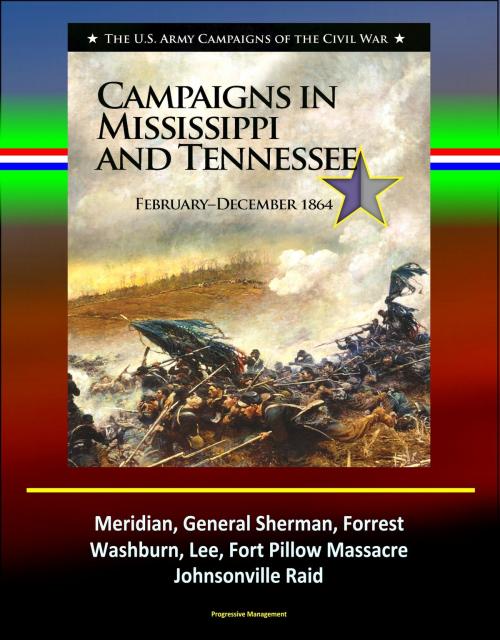Campaigns in Mississippi and Tennessee: February - December 1864 - The U.S. Army Campaigns of the Civil War - Meridian, General Sherman, Forrest, Washburn, Lee, Fort Pillow Massacre, Johnsonville Raid
Nonfiction, History, Americas, United States, Civil War Period (1850-1877), Military| Author: | Progressive Management | ISBN: | 9781310633737 |
| Publisher: | Progressive Management | Publication: | January 30, 2016 |
| Imprint: | Smashwords Edition | Language: | English |
| Author: | Progressive Management |
| ISBN: | 9781310633737 |
| Publisher: | Progressive Management |
| Publication: | January 30, 2016 |
| Imprint: | Smashwords Edition |
| Language: | English |
Professionally converted for accurate flowing-text e-book format reproduction, this book about the U.S. Army campaigns of the Civil War examines the Mississippi and Tennessee campaigns of 1864. As 1863 gave way to 1864, the American Civil War concluded its pivotal year. In the East, the Confederates' long-odds victory at Chancellorsville, Virginia, in May was trumped by the Union triumph at Gettysburg, Pennsylvania, two months later. In Mississippi, the eight-month Vicksburg Campaign culminated in the surrender of the Confederate garrison on the Fourth of July and the opening of the Mississippi River. In Tennessee, Union victories at Knoxville and Chattanooga in November negated the Confederates' stunning success at Chickamauga, Georgia, two months earlier.
Having secured Chattanooga—the "Gateway to the Deep South"—as a forward base, three Union armies were preparing for a spring campaign to capture Atlanta, Georgia: the Army of the Tennessee commanded by Maj. Gen. William T. Sherman, the Army of the Cumberland led by Maj. Gen. George H. Thomas, and the XI Corps and XII Corps from the Army of the Potomac under Maj. Gen. Joseph Hooker. A fourth Federal army, the Army of the Ohio led by Maj. Gen. Ambrose E. Burnside, held Knoxville and thus blocked the Confederate railroad linking Virginia with Tennessee. The overall commander of these four armies was Maj. Gen. Ulysses S. Grant, whose geographic command, the Military Division of the Mississippi, encompassed most of the Western Theater as well as the Department of Arkansas in the Trans-Mississippi region. As the Union Army's most successful commander, Grant had overseen the operations that captured Vicksburg and that routed the Confederate Army of Tennessee at Chattanooga.
After being driven from the mountain ridges overlooking the Gateway City, the Army of Tennessee withdrew into northwestern Georgia to rest and refit for the spring campaign season. On 1 December, the army's much-maligned commander, General Braxton Bragg, tendered his resignation, and one month later, Confederate President Jefferson Davis replaced him with the far more popular—and far more cautious—General Joseph E. Johnston. Having failed to capture Knoxville, the Confederate expeditionary force under Lt. Gen. James Longstreet spent the winter of 1864 in eastern Tennessee to prevent the Army of the Ohio from reinforcing Grant at Chattanooga before returning to the Army of Northern Virginia in the spring.
Professionally converted for accurate flowing-text e-book format reproduction, this book about the U.S. Army campaigns of the Civil War examines the Mississippi and Tennessee campaigns of 1864. As 1863 gave way to 1864, the American Civil War concluded its pivotal year. In the East, the Confederates' long-odds victory at Chancellorsville, Virginia, in May was trumped by the Union triumph at Gettysburg, Pennsylvania, two months later. In Mississippi, the eight-month Vicksburg Campaign culminated in the surrender of the Confederate garrison on the Fourth of July and the opening of the Mississippi River. In Tennessee, Union victories at Knoxville and Chattanooga in November negated the Confederates' stunning success at Chickamauga, Georgia, two months earlier.
Having secured Chattanooga—the "Gateway to the Deep South"—as a forward base, three Union armies were preparing for a spring campaign to capture Atlanta, Georgia: the Army of the Tennessee commanded by Maj. Gen. William T. Sherman, the Army of the Cumberland led by Maj. Gen. George H. Thomas, and the XI Corps and XII Corps from the Army of the Potomac under Maj. Gen. Joseph Hooker. A fourth Federal army, the Army of the Ohio led by Maj. Gen. Ambrose E. Burnside, held Knoxville and thus blocked the Confederate railroad linking Virginia with Tennessee. The overall commander of these four armies was Maj. Gen. Ulysses S. Grant, whose geographic command, the Military Division of the Mississippi, encompassed most of the Western Theater as well as the Department of Arkansas in the Trans-Mississippi region. As the Union Army's most successful commander, Grant had overseen the operations that captured Vicksburg and that routed the Confederate Army of Tennessee at Chattanooga.
After being driven from the mountain ridges overlooking the Gateway City, the Army of Tennessee withdrew into northwestern Georgia to rest and refit for the spring campaign season. On 1 December, the army's much-maligned commander, General Braxton Bragg, tendered his resignation, and one month later, Confederate President Jefferson Davis replaced him with the far more popular—and far more cautious—General Joseph E. Johnston. Having failed to capture Knoxville, the Confederate expeditionary force under Lt. Gen. James Longstreet spent the winter of 1864 in eastern Tennessee to prevent the Army of the Ohio from reinforcing Grant at Chattanooga before returning to the Army of Northern Virginia in the spring.















